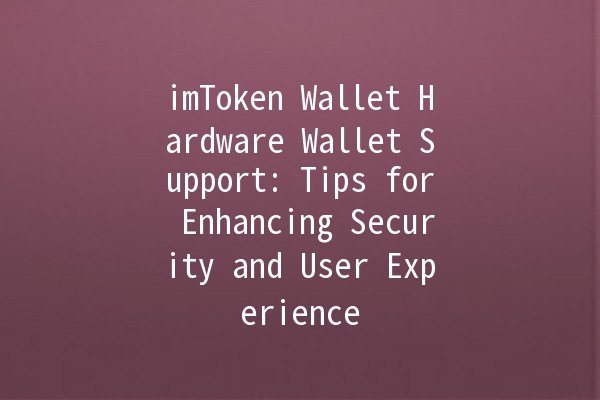As the digital currency landscape continues to evolve, the importance of secure storage solutions like hardware wallets cannot be overstated. Among these solutions, the imToken wallet stands out due to its userfriendly interface and robust security features. In this article, we will delve into the support provided by imToken for hardware wallets, offering practical advice and strategies that enhance users' overall experience and security. This exploration will encompass five specific productivityenhancing tips that ensure users benefit from the full potential of their hardware wallets while maintaining currency safety.
Hardware wallets are essential for anyone dealing with cryptocurrencies, primarily due to their enhanced security measures compared to software wallets. Unlike their software counterparts, hardware wallets store private keys offline, making it significantly harder for hackers to gain access. Given the rise of cyber threats, it is crucial to understand how to effectively utilize hardware wallets in conjunction with software solutions like imToken.
The first productivityenhancing tip is to keep the hardware wallet's firmware up to date. Manufacturers regularly release updates that patch vulnerabilities and add new features. By ensuring that your hardware wallet runs the latest firmware, you can leverage improved security measures and support.

Practical Application: Check for firmware updates on a regular basis, ideally every month. Many hardware wallets provide notifications or have an easytouse interface for updates. For instance, if you're using the Ledger or Trezor wallet alongside imToken, visit their official website to find the latest firmware version and follow the instructions to update your device.
Adding an extra layer of security through TwoFactor Authentication (2FA) is another essential best practice. With 2FA enabled on your imToken wallet, you can prevent unauthorized access through an additional verification process.
Practical Application: When setting up your imToken wallet, enable 2FA using an authenticator app like Google Authenticator or Authy. This step will require a second form of identification, usually a timesensitive code, every time you log in or approve a transaction.
Backups are crucial for financial security. In the event of device theft, damage, or loss, having a backup of your wallet data ensures you can recover your assets.
Practical Application: Use the imToken wallet’s backup feature to export your recovery phrase. Store this phrase in a secure location, preferably offline. Consider using a fireproof safe or a bank safety deposit box for added security. Additionally, you can create multiple copies of this recovery phrase in different locations for redundancy.
Multisignature wallets require multiple private keys to authorize a transaction, which significantly increases security. When managing substantial crypto assets, adopting this approach is wise.
Practical Application: If you hold a considerable amount in your imToken wallet, consider transferring some funds to a multisignature wallet setup. You can use services like Gnosis Safe, which allows you to manage assets collaboratively or independently. This way, even if one key is compromised, the funds remain secure.
Regularly monitoring your transaction history is crucial in identifying any unauthorized access or suspicious activities on your wallet. Keeping track of transactions enhances your awareness and enables quick action when needed.
Practical Application: Log into your imToken wallet and review your transaction history weekly. Enable alerts for any transactions made, so you can receive notifications regarding your balance and transaction activity. Apps like Blockfolio can help track your assets, providing realtime updates and alerts for your holdings, ensuring you stay informed.
Integrating your imToken software wallet with hardware wallets helps streamline processes and enhances security. Here are some best practices tailored for this integration:
Not all hardware wallets are compatible with imToken. Make sure to select wallets that seamlessly integrate with the imToken platform, such as Ledger and Trezor.
Familiarize yourself with the imToken interface and its features. Navigating the wallet properly is essential for maximizing its potential. Understanding how to connect your hardware wallet to the app enhances user experience and security.
Whenever you are about to execute a transaction, doublecheck the recipient’s address and the amount. Human error can lead to significant losses, especially during cryptocurrency transactions.
imToken includes various builtin security features that enhance the security of your transactions. Familiarize yourself with these features to leverage their benefits.
Stay updated with the latest security trends pertaining to cryptocurrency. By educating yourself, you can better protect your investments from emerging threats.
Choosing the best hardware wallet depends on your individual needs. Top options include Ledger and Trezor, both known for their robust security features. Ledger offers a variety of models tailored for different budgets, while Trezor is highly regarded for its userfriendly interface. Always ensure that your selected hardware wallet is supported by imToken!
To keep your hardware wallet secure, regularly update its firmware, use 2FA, store recovery phrases securely, and back up wallet data. It’s also essential to only connect your hardware wallet to trusted devices and networks.
If you lose your hardware wallet, recovery depends on how well you have backed up your recovery phrase. If you have it securely stored, you can regain access to your assets through a new hardware wallet by inputting your recovery phrase.
Using imToken with a hardware wallet means managing your assets through the imToken software while securing your private keys on the hardware device. When making transactions, you will approve them on your hardware wallet, which adds an additional layer of security.
While it’s not strictly necessary, using both a software and hardware wallet provides optimal security and convenience. Your hardware wallet secures your private keys offline, while the software wallet offers easy access to transactions and trading.
Regularly checking your wallet is advisable, especially after any transactions or transfers. Set a routine—perhaps checking weekly or biweekly—to ensure no unauthorized activities or changes have occurred.
By following these tips and integrating essential practices into your use of imToken and hardware wallets, you will enhance both security and user experience. Emphasizing safety measures will not only protect your assets but will also cultivate confidence in your cryptocurrency activities.